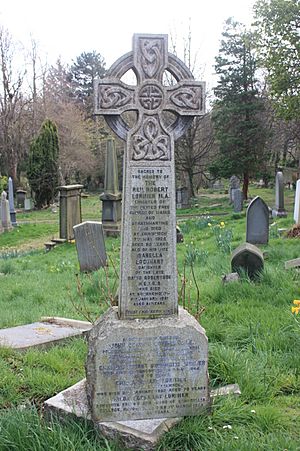Hilda Lorimer facts for kids
Quick facts for kids
Hilda Lorimer
|
|
|---|---|
 |
|
| Born |
Elizabeth Hilda Lockhart Lorimer
30 May 1873 Edinburgh, Scotland
|
| Died | 1 March 1954 (aged 80) |
| Nationality | Scottish |
| Citizenship | United Kingdom |
| Education | High School of Dundee |
| Alma mater | Girton College, Cambridge |
| Scientific career | |
| Institutions | Somerville College, Oxford |
Elizabeth Hilda Lockhart Lorimer (born May 30, 1873 – died March 1, 1954) was a smart British scholar. She spent her entire career at Oxford University. Hilda was best known for her work in Homeric archaeology. This field studies ancient civilizations mentioned in the poems of Homer. She also studied ancient Greece and visited places like Turkey and Albania. During World War II, she became the vice-principal of Somerville College.
Contents
Hilda Lorimer's Family Background
Hilda Lorimer was born in Edinburgh, Scotland, on May 30, 1873. She was the second of eight children. Her parents were Reverend Robert Lorimer and his wife. Many of her siblings also had interesting careers.
Her brother David Lockhart Robertson Lorimer was a soldier and a linguist. He also worked for the British Indian government. Two other brothers, Gordon and Bert, worked in India's civil service. Her brother William became a Professor of Classics at St Andrews. Hilda's sister Emilia became a well-known poet. Another sister, Florence, worked as a personal secretary at the British Museum. People said Hilda could speak ancient Greek and Latin by age five!
Hilda never used her first name, Elizabeth. Her family called her Hiddo. At Oxford, she was known as Highland Hilda because she was from Scotland.
Hilda Lorimer's Education Journey
Hilda went to the High School of Dundee in Scotland from 1889 to 1893. She walked five miles every day to get to school. She won a scholarship to Girton College at Cambridge University. There, she earned a first-class honours degree.
It's interesting to note that women were not officially given degrees at Cambridge until 1948. So, Hilda received her degree 55 years after she had finished her studies!
Hilda Lorimer's Career and Discoveries
In 1896, Hilda became a fellow and tutor of Classics at Somerville College, Oxford. She stayed there for the rest of her career. Hilda was known for her Saturday bird-watching trips. She was also seen as a bit unique and very determined.
She was very good at Latin, but at Oxford, she became more interested in archaeology. Archaeology is the study of human history through digging up old sites. In 1901, she took a break to study at the British School at Athens. This is where she started focusing on Homeric archaeology.
Archaeological Excavations
In 1911, Hilda helped with excavations at Phylakopi on Melos. She was one of the first women to take part in an excavation by the British School at Athens. This dig was led by Richard MacGillivray Dawkins. It was a follow-up to an earlier project at the same site.
Wartime Service
During World War I, Hilda helped with the war effort. In 1916, she worked for the Naval Intelligence Department. The next year, she went to Salonica to work as a nursing assistant. She helped at the Scottish Women's Hospital.
Later Career and Retirement
Hilda earned her Oxford MA in 1920 and her Cambridge MA in 1948. She returned to Athens in 1922. From 1929 to 1937, she was a university lecturer at Oxford. She also taught Classics and classical archaeology at Somerville College.
In 1935, she gave a popular talk about "Temple and Statue Cult in Homer." She was also chosen as the Lady Carlisle Research Fellow at Somerville. Hilda retired in 1939 but remained an honorary fellow. Even in her late 60s, she served as an A.R.P. officer during World War II. She helped with air raid safety in Oxford and Southampton.
Hilda Lorimer passed away on March 1, 1954. She is buried with her siblings in Warriston Cemetery in north Edinburgh.
See also
 In Spanish: Hilda Lorimer para niños
In Spanish: Hilda Lorimer para niños
 | Delilah Pierce |
 | Gordon Parks |
 | Augusta Savage |
 | Charles Ethan Porter |


